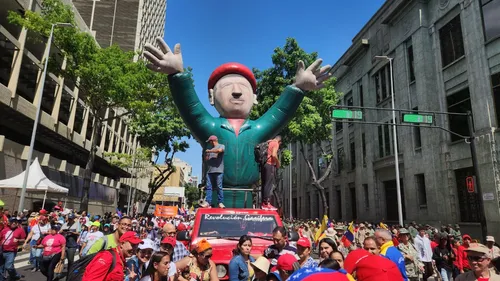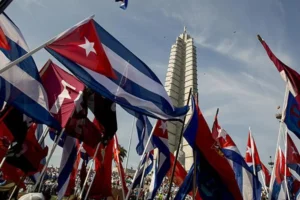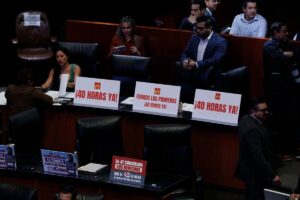
Music, party and a very hot sunny day. This is how protesters from different regions of Venezuela gathered in Caracas this Saturday (13) to commemorate the 22nd anniversary of the coup against former president Hugo Chávez.
The event left Avenida Libertador and ended at the Miraflores Palace, the headquarters of the Venezuelan government. According to the trainer of the Ministry of Communes Thor Marques, one of the main objectives of the demonstration is to keep the memory of that day alive in the memories of Venezuelans:
“For us, it’s a flag: remembering is not forgetting. Especially in relation to the real interests of the right in Venezuela’s political power. After so long of revolutionary work, we are still under attack and this march has weight for showing the expression popular,” he told Brazil in fact.

Thousands of Venezuelans occupied the center of Caracas and marched to the Miraflores Palace / Lorenzo Santiago
The act brought together thousands of Chavistas who marched along Urdaneta Avenue, in the center of the capital. Units of the United Socialist Party of Venezuela (PSUV) from different Venezuelan cities, military personnel and members of the Bolivarian militia – a group formed in 2009 that complements the country’s Armed Forces – walked with songs that recalled the day that Chávez regained power after being arrested by military insurgents and the opposition.
Political scientist David Gomez Rodrigues was just 12 years old when the coup took place. Despite being a child at the time, he claims to remember how “heavy” the media campaign was at the time against the government.
“This moment left a lesson for us in relation to the role of the media. It was the first exercise in widespread fake news to carry out a coup in the country. This moment then shone a light for a new political discourse in relation to communication. From then on, the revolutionary process changed the way of participating in newspapers, radio and television, became more present and strengthened the voice of the people in these spaces”, he says to Brazil in fact.

“To remember is not to forget”, said protesters celebrating the defeat of the 2002 coup / Lorenzo Santiago
Now 34 years old, he took to the streets with his family to remember what he considers a “milestone” for the Venezuelan people. “For the first time in the history of Venezuela and perhaps of humanity, the people are recovering a president through popular mobilization in a civic-military confluence that formed a country project,” he states.
The protesters’ speeches also had a geopolitical character due to the context of the dispute over narratives surrounding the 2024 Venezuelan elections. For activist Jordan Molina, mobilization on a historic day is important to show support for President Nicolás’ “anti-imperialist project”. Mature.
“Even 22 years later we have to march against foreign interference here. That day the interests of the United States were very clear and, two decades later, we are dealing with the same type of posture,” said Molina.
Maduro’s speech
At the end of the march, the President of Venezuela, Nicolás Maduro, gave a speech to supporters at the Miraflores Palace. He defended life imprisonment for people involved in corruption and who attack the State. The statement was made in the week in which the former Minister of Oil and former president of the state-owned oil company Pdvsa, Tareck El Aissami, became the target of an operation by the Public Prosecutor’s Office investigating embezzlements at the company.
“The time has come to carry out a constitutional reform to introduce a life sentence for people involved in cases of corruption and treason against the country,” said Maduro at the end of the march to commemorate the 22nd anniversary of the coup against former president Hugo Chávez.
The MP said he had produced evidence linking the former minister and others involved with the corruption scheme at the state-owned company. El Aissami was arrested along with the former Minister of Economy and former president of the Social Development Fund, Simón Alejandro Zerpa, and the president of the digital bank Bancamiga, Samark López Bello. They would be responsible for the financial operations of the scheme.
In this Saturday’s speech, Maduro once again spoke of the “external attacks” that his government is suffering “from sanctions that harm the economy” and plans to attack him and the Venezuelan State. Without mentioning the former president of Colombia Álvaro Uribe, the head of the Executive of Venezuela said that the population knows that there are people who are planning attacks against him even in the neighboring country.
He also said that the people support the “Essequibo defense law” approved by congress and which determines the gradual incorporation of the territory that is now part of Guyana.
With an audience that filled the outside of the Miraflores Palace, Maduro also focused on the 2002 coup. According to him, it was a time when the people had to face “fascism” to consolidate the Bolivarian project. He also joked about the Venezuelan electoral period. “Today is a day to talk about history, but I wanted to say more things. I can’t so as not to disrespect electoral laws,” he said.
Editing: Lucas Estanislau

Source: www.brasildefato.com.br

